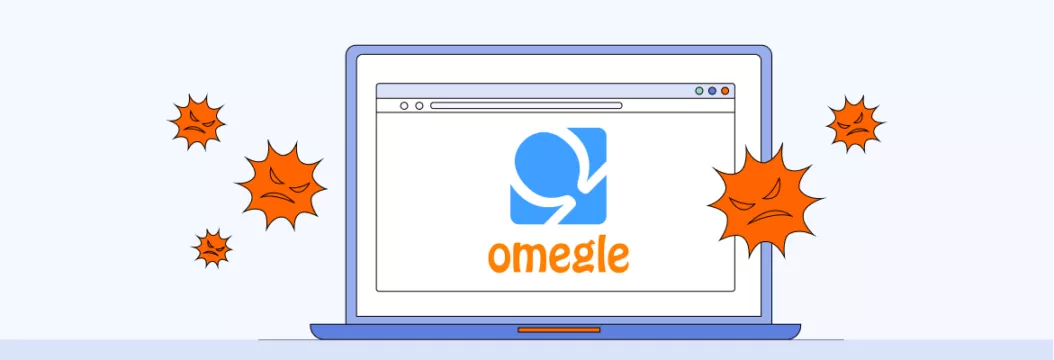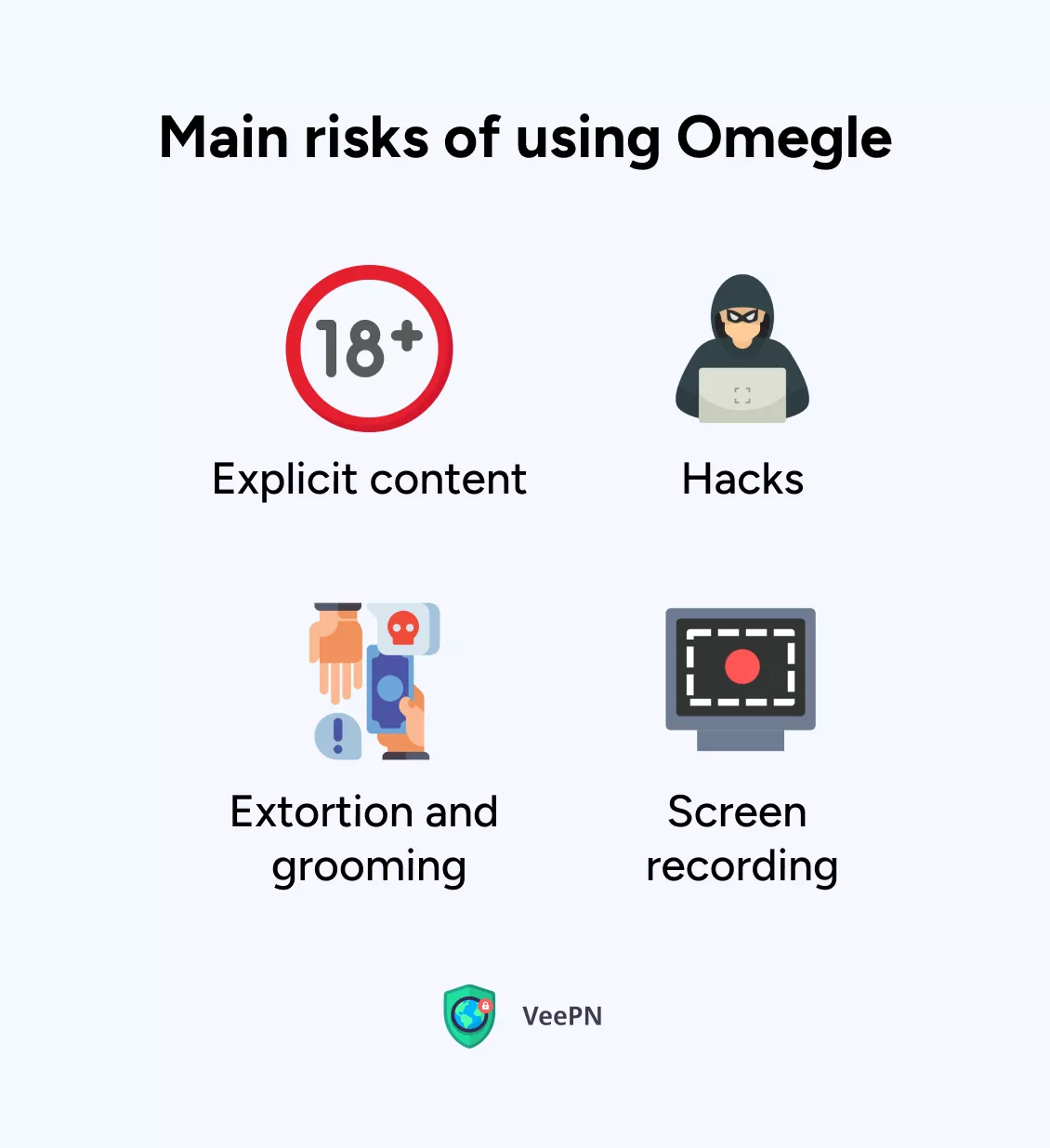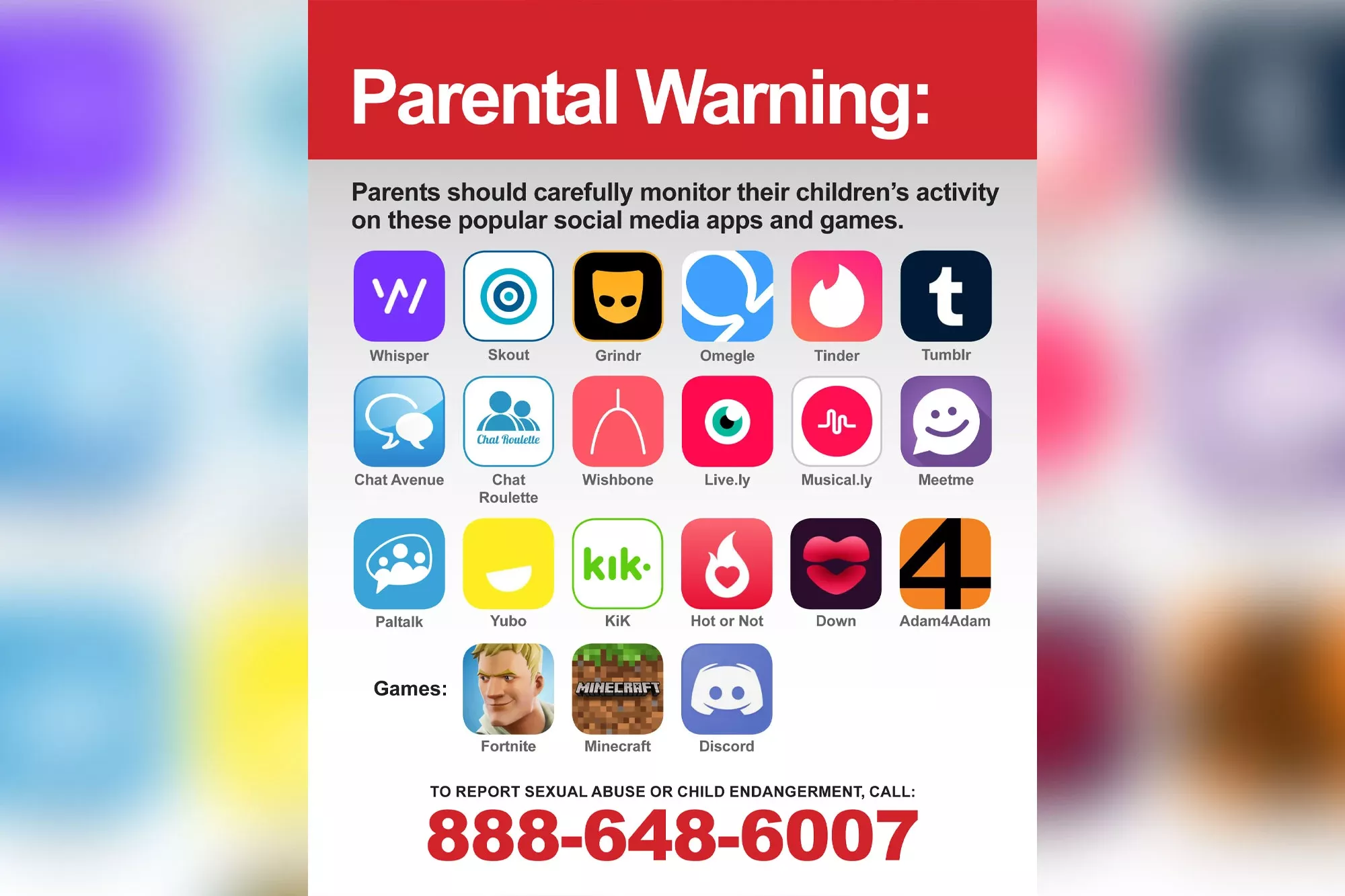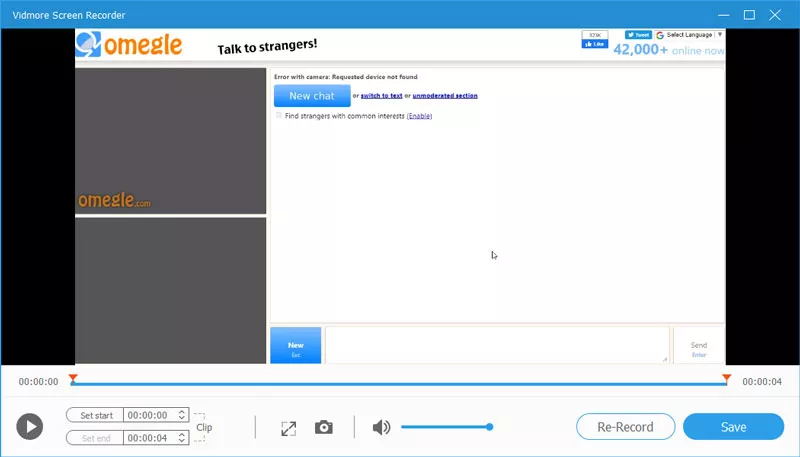Is Omegle Safe? Uncovering the Truth Behind the Chat Platform
Omegle is a popular online video and chat website that pairs random users in virtual rooms without exposing their identities to each other. At first glance, nothing seems bad – users can communicate, have fun, and find new friends. But is Omegle chat safe, really? The truth is, this platform has a dark side, as well. Read along to find out why Omegle can be unsafe and how to protect yourself from its potential dangers.

Omegle online safety overview
Omegle is an online chatting platform that doesn’t offer a legit application, so you can access it only from your browser. Keep in mind that you might come across some evil clones of Omegle that are, in fact, malicious websites striving to compromise users’ private data or infect their devices with malware.
That said, let’s briefly overview the main privacy and security aspects of using Omegle.
- Age limitations. Apparently, like any other online platform that involves chatting with strangers, Omegle isn’t entirely safe for kids. The service’s rules claim that it can only be used by people over 18 or anyone over 13 with their parent’s consent. That’s because there’s a good chance to bump into some adult and even offensive content on Omegle. Many people use it for dating purposes and may spread sexual or even pornographic content.
- Moderation. The platform’s support team moderates text and video chats on Omegle. But the platform has several chat sections, and Omegle support doesn’t revise all of them. These are text, video, collage student, adult, and unmoderated chats. Access to the latter two is for adults only. But there’s nothing that can stop minors from entering those chats, as well. At the same time, many Omegle users are blocked for no reason. If that is your case, check out our blog post on how to get unbanned from Omegle.
- Anonymity. Omegle uses your IP address to connect you with strangers. The service claims not to expose users’ IPs. But while anonymity is generally a good thing, it may leave some room for malicious actors to spread offensive and illicit content without being detected.
- Data retention. According to Omegle’s Terms of Service, the service stores users’ data for 120 days. It includes your IP address, chat logs, and online identifiers. Besides, the Save Chat Logs feature prevents users from erasing their chat information.
As you can see, your privacy and security on Omegle are rather vulnerable. The platform claims to carefully monitor chats and block users for inappropriate behavior. But it’s unlikely that the support team can prevent spreading malicious content in time, making this website quite dangerous for kids.
But is Omegle safe for adults? Unfortunately, someone above 18 may face certain cybersecurity challenges when using this chatting website, too.
The main risks associated with Omegle
Here are the most common risks you may encounter when using Omegle.

Explicit content
As mentioned, Omegle can’t stop all the offenders from spreading inappropriate content. There are simply too many video chats to moderate in real time. The anonymous nature of the platform and the random click-and-go principle it follows often result in displaying explicit, violent, and disturbing videos.
To make things worse, many of those are available to minors. Some of the platform’s sections aren’t intended for kids, but if a minor can access the Internet, they may eventually access an adults-only chat. The illicit content children could come across on Omegle includes anything, from violent acts to nude images.

Hacks
Despite claiming to be fully anonymous, Omegle doesn’t provide viable security measures against potential data leaks and hacks. In fact, a recent study found that a hacker can steal your personal details, including your messages, images from video chats, IP-based geolocation data, and other logs, with the help of a simple Python script. The problem is that Omegle stores users’ information on unprotected website servers that anyone with little hacking knowledge can break into.
As a result, without data encryption, the texts you send and receive on Omegle may appear in the wrong hands. Hackers can then use this information to blackmail or harass users.
Extortion and grooming
Many parents have claimed that their children suffered from a traumatic experience when using Omegle. In particular, the platform has become a goldmine for sexual predators blackmailing teenagers. According to many reviewers, they regularly face adults trying to deceive minors. For instance, grooming is a widespread manipulative technique predators use to build trusting relationships with a child and later exploit or abuse them.
Another common issue malicious actors practice on Omegle extortion (or sextortion). A predator may use images or messages of an inexperienced minor to blackmail them, threatening to reveal evidence of their inappropriate activity (even if they don’t have any evidence of it at all). In one of the most well-known cases, a pedophile manipulated an 11-year-old girl after grooming her and getting her contact information.
Here’s another example of cyberbullying on Omegle a user posted on Reddit:

Unsurprisingly, authorities often include Omegle in the list of apps children can use only under their parents’ strict control.

Screen recording
Did you know that strangers may secretly record your video chat? It’s enough to use a screen-recording app or a screenshot function on their device to capture your conversation. So remember, anything that happens on a video chat can be stored and then used against you. Omegle doesn’t apply any measures against users doing so, which is why you should communicate on such platforms with extra caution.

Considering the above, it’s better not to let children use Omegle without their parents’ careful control. As for adults, several effective measures help stay away from danger when using this platform. Let’s look at them in greater detail.
How to stay safe on Omegle
Here are the most effective methods to protect yourself from the risks associated with Omegle.
1. Avoid suspicious links
When using an online chatting website like Omegle, don’t click on any external links provided by strangers. They may take you to a shady website infected with malware or compromise your data in a phishing attack. Remember that even if a web page looks legit, it may turn out to be a malicious copy.
2. Don’t overshare your personal information
One of the critical mistakes people make when chatting with strangers is sharing their private data. Avoid exposing your actual location or providing links to your social media accounts to someone you don’t know. This especially applies to kids who often fall victim to grooming and other social engineering techniques.
3. Use parental controls
If you want to protect your child from the risks associated with Omegle, you can use parental control software. Although Omegle itself doesn’t provide this option, you may turn to a third-party application to block your kids’ access to dangerous websites and monitor activities that can harm them.
4. Consider Omegle alternatives
Keep in mind that all websites and apps designed for communicating with strangers have one thing in common – they aren’t secure. Moreover, platforms like Omegle collect lots of customer information, so your personal data may be compromised due to a data breach.
Indeed, other social media services, including Instagram, Snapchat, and Tinder, have their own problems related to privacy and security. However, users aren’t anonymous and can be blocked, which minimizes the risk of being targeted by a predator or threat actors.
5. Use a VPN
Last but not least, using a trustworthy virtual private network (VPN) tool is essential when chatting with people on unsafe websites like Omegle. It’s a powerful cybersecurity solution that keeps you away from potential scams, malicious websites, infected links, phishing attacks, and more, thanks to a reliable feature like VeePN’s NetGuard.
Besides, a VPN enhances your privacy by hiding your IP address and altering it with an anonymous IP of a remote server. Furthermore, it encrypts your traffic along the way, so hackers, snoopers, and other third parties have no chance to compromise your private information online. This way, even if your IP or other private details become visible to other users on Omegle, they will only see gibberish text.
Note that not all VPNs are credible. Free services often lack important functionality. Besides, they may appear to be fake tools aiming to collect and sell your personal information or even introduce malware to your device. That’s why we recommend choosing a reliable VPN for Omegle, like VeePN. It follows a strict No Logs policy (doesn’t collect sensitive customer information) and offers a wide range of online privacy and security features.
Here’s how to get started with VeePN in several simple steps.
How to use a VPN for Omegle
- Sign up for VeePN. Create a VeePN account and pick the most suitable pricing plan.

- Download and install VeePN. Choose a VPN app for Windows, macOS, Linux, iOS, Android, or any other operating system and download it on your device.

- Select a VPN server. Pick any virtual location to get an alternative IP address, be it the US, Spain, Poland, Egypt, New Zealand, or else. Also, you can use the Optimal Location feature that will automatically connect you to the fastest VPN server (most often, it’s one near your actual location).

- Turn your VPN on. You’re all set – just tap the big switch button at the center of your screen to run VeePN.

- Chat privately. Enjoy your communication without exposing your IP and other private details to strangers.
Try VeePN now – download the app on your device and test if it works for you with a 30-day money-back guarantee!
FAQ: Is Omegle Safe?
Omegle is a video chatting platform available via a web browser. You don’t need to download an app and create an account to start using it. Omegle connects random users in private chatting rooms, following the click-and-go principle – you can leave a chat and move to the next one whenever you like. Omegle has several chat types for different user needs, including text and video chats, as well as college students, adult, and unmoderated sections.
Yes. Omegle poses many threats to kids and teenagers, as it may contain some explicit or violent content. Besides, not all of its chats are permanently moderated. On top of that, some common dangers associated with Omegle are hacks, cyberbullying, extortion, grooming, and privacy concerns. Read this article to find the details.
Yes, hackers can steal your private data on Omegle. The anonymous nature of this platform doesn’t mean that your data isn’t collected. On the contrary, the platform gathers your metadata (IP address, cookie ID, and so on), full logs of text chats, and some images from video chats. Then, this data is stored on the website’s servers hackers can easily compromise to steal sensitive information of Omegle users. Read this article to learn more.
No, Omegle isn’t entirely safe to use on any device, whether it’s a phone, laptop, or PC, especially for kids. The thing is that not all Omegle chats are moderated, which means there’s a risk of coming across malicious or explicit content. Moreover, Omegle collects and stores customer data that may eventually fall into hackers’ hands. For more details, read this article.
Although Omegle claims to be anonymous, it may expose some personal details of users. In particular, a snooper may detect your location by accessing your IP address. Also, some information stored on Omegle’s servers may be stolen due to a hack or data breach. Check out this article to find out more.
No, Omegle is generally an unsafe platform due to many privacy and security issues. A VPN is one of the most effective ways to protect yourself when chatting on this website. It encrypts your traffic and alters your actual IP address, so you can be sure that no one can track your location and steal your private information. However, note that a VPN won’t protect you if you share your personal information with strangers during a conversation.
VeePN is freedom
Download VeePN Client for All Platforms
Enjoy a smooth VPN experience anywhere, anytime. No matter the device you have — phone or laptop, tablet or router — VeePN’s next-gen data protection and ultra-fast speeds will cover all of them.
Download for PC Download for Mac IOS and Android App
IOS and Android App
Want secure browsing while reading this?
See the difference for yourself - Try VeePN PRO for 3-days for $1, no risk, no pressure.
Start My $1 TrialThen VeePN PRO 1-year plan






